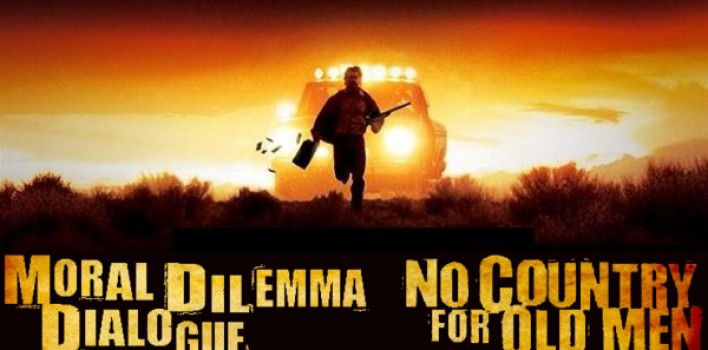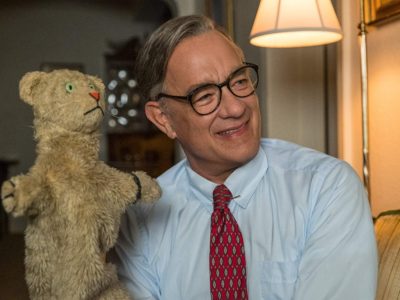Moral Dilemma Dialogue: No Country for Old Men
In the Moral Dilemma Dialogue series, we take one film and examine a moral dilemma presented within it. Two people take opposing sides of the dilemma and argue their case. The arguments are presented sight-unseen of the opposing side’s approach, and with no rebuttal. That is where you, the audience, come in.
The Dilemma
Retire in the face of evil, or stay in the fight?
Background
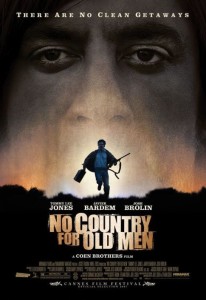 Few villains have so perfectly embodied a picture of unflinching and emotionally detached evil so well as Javier Bardem as Anton Chigurh in the Coen Brothers’ 2007 adaptation No Country for Old Men. If you’re in the wrong place at the wrong time with this guy, little more than the flip of a coin stands between you and your fate. An evil like this is one you don’t see every day. It’s one that can drive even the staunchest of lawmen to an early retirement. This is what Sheriff Ed Tom Bell faced in the twilight of his career. In the end, one can’t help but wonder what the right path is when facing such evil; retire or stay in the fight?
Few villains have so perfectly embodied a picture of unflinching and emotionally detached evil so well as Javier Bardem as Anton Chigurh in the Coen Brothers’ 2007 adaptation No Country for Old Men. If you’re in the wrong place at the wrong time with this guy, little more than the flip of a coin stands between you and your fate. An evil like this is one you don’t see every day. It’s one that can drive even the staunchest of lawmen to an early retirement. This is what Sheriff Ed Tom Bell faced in the twilight of his career. In the end, one can’t help but wonder what the right path is when facing such evil; retire or stay in the fight?
Gene and Josh submit themselves to this dilemma for your consideration. They both present opposing sides to this dilemma, and for this segment of the Moral Dilemma Dialogue, they will each be giving a Christian perspective. While they are both presenting their argument to the best of their abilities, they are doing so to get a conversation going. They each may actually hold different opinions in real life. We welcome your critique, questions, and of course your own perspective as well!
Perspective One: Gene Christian argument for retiring in the face of evil
Tucking tail and running. Doesn’t sound too inspiring, does it? I admit, it’s not something I would say to my huddle of football players as their coach, but we’re not talking about a turf battle here. We’re talking about spiritual warfare. This is a different kind of fight which requires a different kind of strategy. If this were a gridiron battle I would say hit harder. If this were a battlefield I would say shoot straighter. In this spiritual battle, is the answer really to evangelize more?
By the end of No Country for Old Men, Sheriff Bell has reached the end of his ropes. He feels helpless in the wake of an evil world that plunges to depths he is both unprepared for and unfamiliar with. He has fought back against lawbreakers and evil men his entire career but now finds himself wanting in the face of new threats of unthinkable brutality. He decides to walk away from it, and who can honestly blame him? He is not only outmatched in this conflict, he’s at the end of a career of fighting for justice. He has earned his time watching the sun set. Is he conflicted about it? Sure! Is it still the right decision? Absolutely.
To be perfectly clear, when I advocate for “retiring in the face of evil”, I am not suggesting that we call it quits after the first wall we hit. I’m not even saying we find our own little hole to crawl in and disappear completely. What I am arguing for is knowing our limits, and the point at which our efforts and talents would be better spent elsewhere. Retiring from a conflict against an evil which bears no fruit, and shows no sign of bearing fruit in the future. This may not seem like the chivalrous thing to do. This may seem like we’re abandoning the command to “go, and make disciples of all the world…”. But in reality, we’re choosing to plant our seeds on the fertile ground rather than on the rock (Mt. 13), just as we find being done in the New Testament.
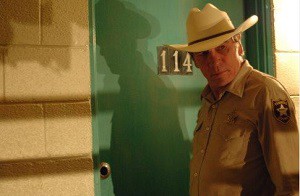 The first of such times is the words of Christ as he gave his disciples instruction for a specific trip to “the lost sheep of the house of Israel” to preach to them concerning the kingdom of heaven. He gives them many instructions, including to heal the sick, raise the dead, and cleanse the lepers. He also tells them, “Whoever does not receive you, nor heed your words, as you go out of that house or that city, shake the dust off your feet.” (Mt. 10:14). He doesn’t tell them to stay and continue with their miracles. He doesn’t say to continue arguing with them. This is a clear indication that there exists a point at which it is no longer fruitful to continue in your efforts, and your time is better spent elsewhere. Now, is this retiring? Well, yes and no. We typically think of retirement as an ending. When something draws to a close. And that’s true. What isn’t true, however, is the assumption that all activities cease and no more can be done in other ways, or in other places. That was certainly the case with these disciples. They retired from those places which didn’t welcome them and moved on to other fertile ground.
The first of such times is the words of Christ as he gave his disciples instruction for a specific trip to “the lost sheep of the house of Israel” to preach to them concerning the kingdom of heaven. He gives them many instructions, including to heal the sick, raise the dead, and cleanse the lepers. He also tells them, “Whoever does not receive you, nor heed your words, as you go out of that house or that city, shake the dust off your feet.” (Mt. 10:14). He doesn’t tell them to stay and continue with their miracles. He doesn’t say to continue arguing with them. This is a clear indication that there exists a point at which it is no longer fruitful to continue in your efforts, and your time is better spent elsewhere. Now, is this retiring? Well, yes and no. We typically think of retirement as an ending. When something draws to a close. And that’s true. What isn’t true, however, is the assumption that all activities cease and no more can be done in other ways, or in other places. That was certainly the case with these disciples. They retired from those places which didn’t welcome them and moved on to other fertile ground.
Another clear example is when Paul decided to turn to the Gentiles. In Acts 13 we find him on his first missionary journey. He and Barnabas are often meeting in the synagogues, speaking to their fellow Israelites about their Messiah. But even for them there came a point where their words weren’t bearing fruit to the crowd they were focusing on. In Acts 13: 46, Paul and Barnabas boldly declared that they would now turn to the gentiles considering the attitudes of the Jews. Not only did this fulfill prophecy, it was a good thing for the church at the time, “But they shook off the dust of their feet in protest against them and went to Iconium. And the disciples were continually filled with joy and with the Holy Spirit.” (Acts 13:51f). You might say they “retired” from their work among the Jews, and turned to focus on the gentiles.
Now, back to the question at hand; is it better to retire in the face of evil, or stay in the fight? I submit that in many ways, retiring can be the choice that actually bears the most fruit. In that way, it’s a bit of a paradox. If I cease my efforts in a certain fight, I’m now more available for other fights. I’m also more available to counsel others replacing me in that fight. Do we think that Sheriff Bell had no words of wisdom for his replacement? Couldn’t he remove himself from the field of battle as he did, and become entrenched in less dangerous areas where his knowledge and experience could come into good use? I certainly think so.
To conclude, I am not advocating that we all step away from any conflict in front of us the moment we encounter some push back. What I’m saying is that retiring from certain fights can often lead to greater gains for the kingdom than remaining in a battle which will clearly bear no fruit for anyone involved.
Perspective Two: Josh Christian argument for staying in the fight against evil
In Joel and Ethan Coen’s adaptation of the Cormac McCarthy novel, No Country For Old Men, protagonist Sheriff Ed Tom Bell, played by Tommy Lee Jones, narrates an opening scene of what first appears to be a sunset receding in the blackened Texas landscape. Slowly, as Jones rough-sawn voice rasps over this unfolding scene, the sun begins to rise and the black fields are bathed in the light of the sun. It harkens to a Genesis-like primordial beginning to this Western tale. And it’s more. It’s light exposing the dark, clueing us into the movie we are about to view. In this movie, darkness is going to be exposed, not conquered by light but made plain before us.
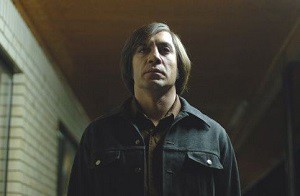 The Death-like specter of Anton Chigurh (Javier Bardem) casts a shadow of destruction that is less about the horrific and bloody violence of his actions, though they are, and more about the many characters’ reactions to it. Specifically, as Sheriff Bell follows in the wake of Chigurh’s violence, he contemplates the world in which he lives in comparison to the one his father and grandfather occupied as lawmen. In the opening dialogue, Bell muses about what to make of some sheriffs, from previous generations, not even carrying a gun on their person. In times such as this, with what Bell has seen, the world he lives in is too harsh, too unforgiving, and bathed in darkness.
The Death-like specter of Anton Chigurh (Javier Bardem) casts a shadow of destruction that is less about the horrific and bloody violence of his actions, though they are, and more about the many characters’ reactions to it. Specifically, as Sheriff Bell follows in the wake of Chigurh’s violence, he contemplates the world in which he lives in comparison to the one his father and grandfather occupied as lawmen. In the opening dialogue, Bell muses about what to make of some sheriffs, from previous generations, not even carrying a gun on their person. In times such as this, with what Bell has seen, the world he lives in is too harsh, too unforgiving, and bathed in darkness.
As we come to learn, as the Preacher from Ecclesiastes would say, there is nothing new under the sun. When Bell visits his cousin, Ellis, who was confined to a wheelchair when shot by a felon, Ellis tells him the story of his Uncle Max, a Texas Ranger. Uncle Max’s “reward” for his years of service to the Rangers in the early 20th century was to be shot by a group of Native Americans on his front porch. “Whatcha got ain’t nothin new,” Ellis preaches, “this country’s hard on people, you can’t stop what’s coming, it ain’t all waiting on you. That’s vanity.” The rough, hard world of No Country For Old Men, a world not much unlike our own, shares much with the ancient world described at the end of the Book of Judges where “everyone did as they saw fit,” (Judges 21:25). Justice is meted out just as readily, if not more so, as corruption and inequity. Chigurh, as the black-clad angel of Death, shares similarities to Ingrid Bergman’s personification of death in The Seventh Seal. Incapable of empathy and tied to the fatalistic coin toss, Chigurh’s violence is a telling look into Bell’s ultimate conclusion to retire in the face of evil. If everyone is prone to do as they see fit and we cannot stop it, it is truly the height of pride to believe we can bear the burden of responsibility for righting wrong and pursuing justice. To retire from the fight seems the most existentially logical decision.
However, is that really the best conclusion we can reach? While the worldview of the Coen’s, ultimately the construct of the source material from McCarthy, it is not far off from how Scriptures handle the human condition and injustice. Both the Old and New Testament do not shy away from this reality.
Besides the admission of Judges, throughout the book of Ecclesiastes, the Preacher speaks to the seeming hopelessness of “life under the sun.”
“As everyone comes, so they depart, and what do they gain, since they toil for the wind? All their days they eat in darkness, with great frustration, affliction, and anger.” Ecclesiastes 5:16-17 (NIV).
The prophet Isaiah laments the state of Israel and their sin:
“So justice is driven back, and righteousness stands at a distance; truth has stumbled in the streets, honesty cannot enter. Truth is nowhere to be found, and whoever shuns evil becomes a prey.” Isaiah 59:14-15 (NIV)
And the majority of us are going to be familiar with Paul’s quoting of a passage found in Ecclesiastes, as well as Psalm 14 and 53:
“There is no one righteous, not even one; there is no one who understands; there is no one who seeks God. All have turned away; they have together become worthless; there is no one who does good, not even one.” Romans 3:10-12 (NIV)
It cannot be argued that, somehow, the Christian is ignorant of injustice, suffering, and inequity in our world. The harsh, southwest climate where Chigurh stalks is not foreign to the God of the Universe or those who were inspired by the Spirit to record the words found in our Bibles.
The dark and seemingly unredeemable nature of our world were not left in despair, nor should it be left in despair. In our hopeless state of sin, rebellion, doing whatever we see fit, both our imperfect motives, which remain imperfect, and our imperfect works, which remain imperfect, have been redeemed and infused with righteous purpose by the life, death, and resurrection of Jesus.
“For it is by grace you have been saved, through faith—and this is not from yourselves, it is the gift of God— not by works, so that no one can boast. For we are God’s handiwork, created in Christ Jesus to do good works, which God prepared in advance for us to do.” Ephesians 2:8-10 (NIV)
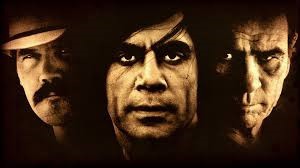 When we accept both the sovereignty of God in all things, as well as his great and powerful love for us through Jesus Christ, we are called not to bear the burden and responsibility on our own, but as ambassadors and servants of Christ the King. To fold in the face of evil and retire is no longer a decision that rests on our shoulders. We can stay in the fight, run the good race of faith, and trust the Spirit of Christ is both working for us and with us to bring restoration and healing to this world. And ultimately, we, as Christians have faith Christ will come again and make all things new. Sadness, death, pain, and injustice will be done away with and righteousness will reign.
When we accept both the sovereignty of God in all things, as well as his great and powerful love for us through Jesus Christ, we are called not to bear the burden and responsibility on our own, but as ambassadors and servants of Christ the King. To fold in the face of evil and retire is no longer a decision that rests on our shoulders. We can stay in the fight, run the good race of faith, and trust the Spirit of Christ is both working for us and with us to bring restoration and healing to this world. And ultimately, we, as Christians have faith Christ will come again and make all things new. Sadness, death, pain, and injustice will be done away with and righteousness will reign.
While a surface reading of No Country For Old Men would seem to stand in opposition to this mentality, the final scene of the movie belies much of what has come before it. Ed Tom, now retired, relays a dream he had to his wife. He sees his father, on horseback, leading the way through a pitch black mountain pass:
Ed Tom: It was cold and there was snow on the ground and he rode past me and kept on goin’. Never said nothin’ goin’ by. He just rode on past… and he had his blanket wrapped around him and his head down and when he rode past I seen he was carryin’ fire in a horn the way people used to do and I could see the horn from the light inside of it. ‘Bout the color of the moon. And in the dream I knew that he was goin’ on ahead and he was fixin’ to make a fire somewhere out there in all that dark and all that cold, and I knew that whenever I got there he would be there.
No longer is the light bringing the dark deeds into the light, nor are the shadows looming in the light, but the light is leading the way in the darkness. While it seems like only a sliver, Ed Tom sees hope for a better way in the darkness. While it is not explicit, I like to believe that hope is the light of Christ leading our way in our darkest times and in this world’s darkest moments.
“Yet I am writing you a new command; its truth is seen in him and in you because the darkness is passing and the true light is already shining.” 1 John 2:8 (NIV)
And then I woke up…
Conclusion
This is where the true dialogue part of this post comes in. Where do you fall on this dilemma? Does Gene make a good point about retiring from a fight with evil when it’s clear no fruit will come of it? What about Josh’s encouragement to continue running the good race and trust the Spirit is working for and with us to restore the world? Please vote in the poll, and let your voice be heard by commenting below.


